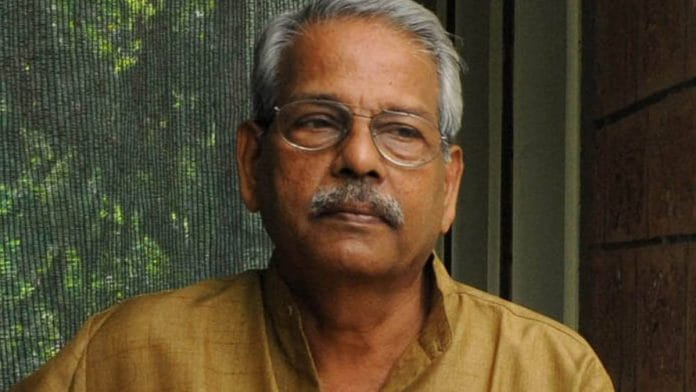New Delhi: Malayalam writer-director C. Radhakrishnan stepped down as a distinguished member of the Sahitya Akademi this week, citing his objection to this year’s Akademi literary festival being opened by a Union minister ‘without any evident literary credentials’.
Union Minister Arjun Ram Meghwal had inaugurated the 39th edition of ‘Sahityotsav: The Festival of Letters’, organised by Sahitya Akademi from 11 to 16 March, which brings thousands of authors together participating in more than 170 languages.
The author stated in his resignation letter Monday that he was expressing dissent against this year’s festival being inaugurated by a “Cabinet Minister of the Government of India, a person without any known credentials whatsoever in literature”.
While it was set up by the government in 1954, the Sahitya Akademi functions as an autonomous organisation, according to its website.
“There were many occasions when the representatives of the ministry of culture wanted to take the reins of the Akademi in their hands. They could not succeed because most members were against it and joined hands to uphold the autonomy of the Akademi,” Radhakrishnan told ThePrint in a written communication Friday.
Radhakrishnan, who is also known as a filmmaker, has been associated with the Akademi for 23 years and was its executive member from 2013 to 2017. He was re-elected as an “eminent member” in 2022.
The Akademi responded to Radhakrishnan’s charges and released a statement later in the evening on the same day. It termed the author’s resignation as “misleading” while stating that Meghwal is a writer who is well-versed in Rajasthani and Hindi.
“His publications in Hindi include Ek Safar Humsafar Ke Saath, Divya Path Dampatya Ka, Bhartiya Mulya Va Paramparaon Ko Shashakt Karnewala Kanoon, etc,” it said.
Radhakrishnan, whose literary recognition includes Ezhuthachan Puraskaram, Moortidevi Award and Mathrubhumi Literary Award, termed the Akademi’s response as a “diversionary tactic”.
He told ThePrint the issue is not whether the Union minister is a well-known writer or not, it is about the “deadly virus of politicisation”.
“(Politicians) Atal Bihari Vajpayee ji, Murli Manohar Joshi ji, and the like, despite their eminence as writers, had stayed away,” he pointed out.
“Unfortunately for me, I had not heard about him but though his other achievements are recorded, there is no mention of any book written by him or any recognition conferred to him on this basis,” he said, referring to Meghwal.
Dr K. Sreenivasarao, secretary of Sahitya Akademi, told ThePrint over phone that the culture minister has the right to inaugurate the event while emphasising that it “does not affect the autonomy of the institution”.
When ThePrint reached Meghwal over phone for comment, the Union minister said he had “no idea” about Radhakrishnan’s protest and that he was busy campaigning for the upcoming polls.
Also Read: Uttar Pradesh had a thriving literary culture in the 1980s, but proximity to Delhi killed it
‘Can’t blame any particular party’
Radhakrishnan has authored more than 60 pieces across various genres, including novels, short stories, science fiction articles and poems, contributed as a screenwriter for the film Priya, and has directed movies such as Agni, Kanalattam, Pushyaragam, and Ottayadipathakal.
His debut novel Nizhalppadukal achieved tremendous success, earning him the Kerala Sahitya Akademi Award in the same year, 1962.
Speaking to ThePrint, Radhakrishnan also alleged that the other two academies, Lalit Kala and Sangeet Natak Akademi, have already “lost their autonomy”.
“Both academies had the same kind of constitution to begin with. Now both are ad hoc bodies. The transitions happened long before the present ruling party at the Centre came to power. So one can’t blame any particular party for this kind of transition. The basic issue is the politicisation of these bodies,” he said.
Earlier, in 2015, writer Nayantara Sahgal and poet Ashok Vajpeyi returned their Sahitya Akademi awards, alleging that the government was faced with a genuine challenge which arose from the absence of individuals with expertise and vision to lead cultural institutions.
Asked if the Akademi members had raised the issue with the administration, Radhakrishnan said they had complained last year when the culture minister had inaugurated the literary festival, overriding all precedents, and assurance was given that it would not be repeated.
The secretary of the Sahitya Akademi, however, denied giving any assurance of the sort and said that it was only Radhakrishnan who had a problem, and none of the other members brought it up.
Radhakrishnan told ThePrint he was afraid that this sort of “politicisation” would lead to rule by a “coterie of committee members” in tandem with a “parallel corrupt faction developing within the Secretariat (Akademi)”.
“I was not alone. But I did not want anyone else to resign because it would have truncated the Akademi, making its transition into an ad hoc system easier,” he added.
(Edited by Nida Fatima Siddiqui)
Also Read: Sahitya Akademi is a failed Nehruvian project. Now it has to survive in a ‘digital’ India






